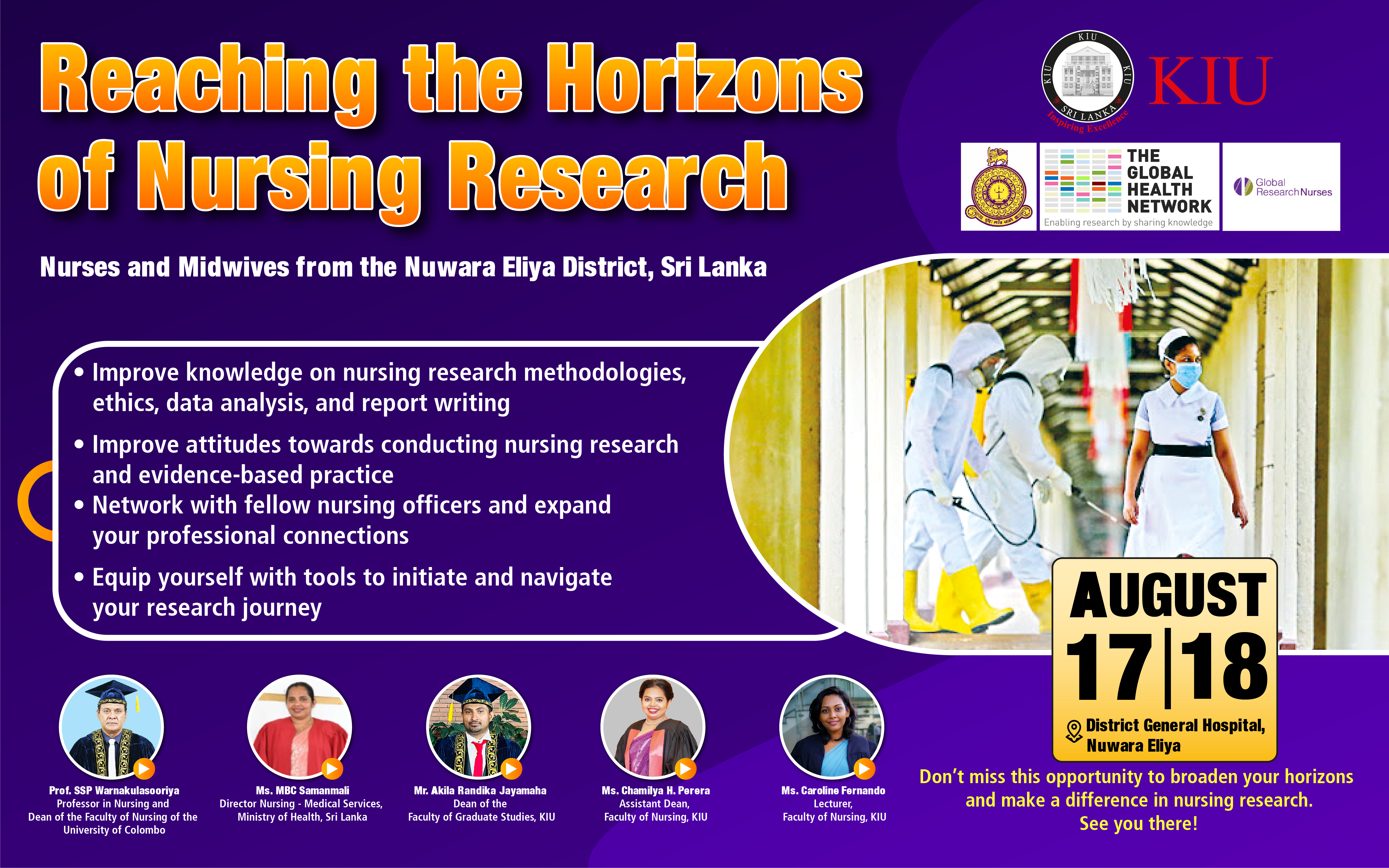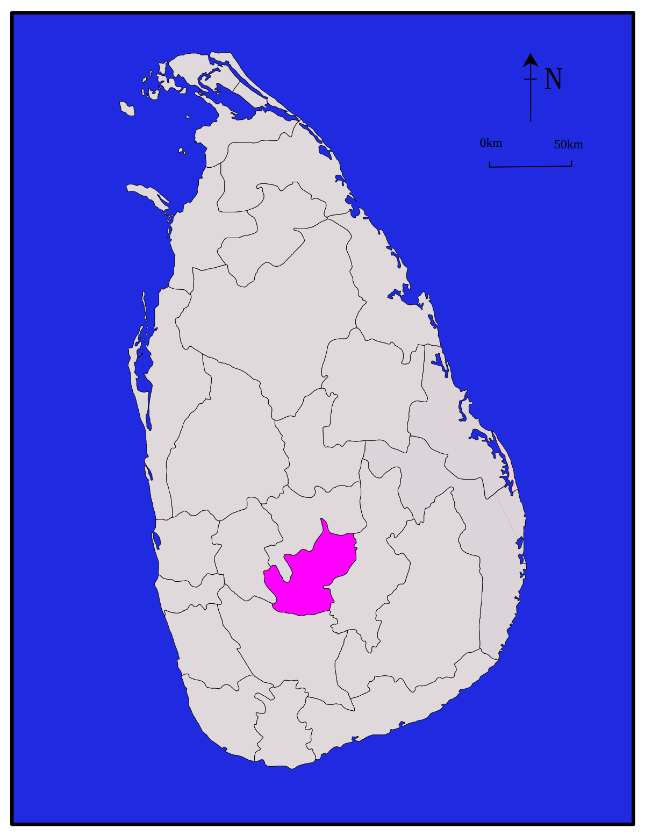Reaching the Horizons of Nursing Research in Nuwara Eliya, Sri LankaFor Nurses and MidwivesIn person workshopUpdated dates: 17-18 August 2024Time: 8-5pm (GMT +5:30)
To bridge this gap, the proposed workshop "Reaching the Horizons of Nursing Research" aims to provide tailored training on research methodologies, ethics, and data analysis to nurses and midwives in the Nuwara Eliya district. This initiative seeks to empower participants to design and conduct high-quality research studies addressing specific challenges unique to their workplaces, ultimately enhancing their capacity to contribute to evidence-based nursing practices in Sri Lanka. [image: Nuwara Eliya District of Sri Lanka] |
Workshop outcomesEvidence-based nursing, as defined by the International Council of Nurses (2012), is “a problem-solving approach to clinical decision-making that incorporates searching for the best and latest evidence, clinical expertise and assessment, and patient preference value within a context of caring”. While it has become a global standard for improving patient outcomes, Sri Lanka faces significant challenges in implementing evidence-based practices. Factors such as limited exposure to research, inadequate training, language barriers, and heavy workloads hinder nurses' engagement in research activities. Additionally, Sri Lanka's nursing education system, mainly focused on diploma programs, offers limited research experience.Today, evidence-based practice is fundamental to nursing worldwide, enhancing patient outcomes and quality of care. However, in Sri Lanka, evidence-based nursing practice lags in contrast with global standards. Numerous challenges hinder its implementation. At present, there are limited pathways to empower nursing professionals toward the research culture. Clinical nurses are reluctant to engage in research because they lack the necessary knowledge and exposure to engage in research, facing barriers such as language limitations, inadequate computer literacy, and heavy workloads due to staff shortages. Moreover, the education system for nurses in Sri Lanka is primarily based on Nursing Diploma programs, in which it is not mandatory to conduct a research project and offers limited exposure to research. Only a very few nurses with a Nursing bachelor’s degree (having completed a research project component) and enough knowledge and exposure are absorbed into the government nursing profession in Sri Lanka. Evidence from other countries may not be directly applicable to Sri Lanka's context, as a result, utilizing such evidence for changing the nursing practices in Sri Lanka is not suitable. It emphasizes the need for our own research to acquire evidence-based nursing. KAATSU International University (KIU) Sri Lanka recognized the significant gap in nursing research knowledge and addressed it by organizing a first research workshop for government nurses, made possible through the GRN workshop grant in 2023. This initiative led to KIU conducting numerous research capacity-building workshops at Nursing Training Schools (NTS) and several government hospitals across the country. Research experts from KIU traveled to various NTS locations, including those in more remote areas beyond Colombo, to share knowledge and engage with nursing students. During these visits, it became clear that nurses in rural areas had far less exposure to nursing research compared to their peers in the more developed, urban centers around Colombo. These regions lacked the necessary resources and infrastructure to support research engagement, and many nurses expressed a strong desire for more opportunities to learn and participate in research activities. However, transportation challenges, with some nurses needing to travel distances of up to 160 km, and time constraints due to staff shortages, often prevented their participation in workshops held in Colombo. This situation highlighted the critical need to enhance research exposure and training for nurses in remote areas, fostering equitable access to research education and capacity-building opportunities across the country. This second workshop “Reaching the Horizons of Nursing Research” aimed to address this gap by providing tailored training on research methodologies, ethics, and data analysis to Sri Lankan nurses employed at Nuwara Eliya district, an area further away from Colombo, in Sri Lanka. The workshop focused on specific research needs, providing practical guidance and support for designing and conducting research studies which enabled the participants to set up their Nursing research study addressing specific problems unique to their workplaces. Workshop Highlights
The workshop successfully improved nursing research knowledge and attitudes, laying a foundation for future capacity-building initiatives. |
Aims and objectives of the workshop:
- To assess the baseline knowledge and attitudes on nursing research among nursing officers in government hospitals of Nuwara Eliya District, Sri Lanka.
- To improve knowledge on nursing research methodologies, ethics, data analysis, and report writing among nursing officers in government hospitals of Nuwara Eliya District, Sri Lanka.
- To improve attitudes towards conducting nursing research and evidence-based practice.
- To empower the nursing officers in government hospitals of Nuwara Eliya District, to design and conduct high-quality research studies in Sri Lanka
Anticipated outputs
- A baseline assessment report will be generated summarizing the baseline knowledge and attitudes towards nursing research among the participant nursing officers, which will provide insights into areas needing improvement.
- Enhance the research competency in nursing research methodologies, ethics, data analysis, and report writing among nursing officers in government hospitals of Nuwara Eliya District, Sri Lanka.
- Development of actionable research project proposals by participant nursing officers, tailored to address specific issues within their respective healthcare settings.
- Increase the number of nursing officers actively participating in research activities, demonstrating a shift towards evidence-based decision-making and policy development.
- Establishment of a sustainable research culture within the nursing community in Nuwara Eliya District, facilitated by ongoing support and resources from KIU and GRN.
- Strengthened networking and collaboration among nursing officers, research experts, and healthcare institutions, fostering a community dedicated to advancing nursing research in Sri Lanka.


 In Sri Lanka, evidence-based nursing practice significantly lags behind global standards, primarily due to numerous challenges in implementing a research culture among nursing professionals. Clinical nurses often face barriers such as limited research knowledge, language constraints, inadequate computer literacy, and heavy workloads resulting from staff shortages. The current nursing education system, predominantly based on diploma programs, does not mandate research projects, offering minimal exposure to research activities. As a result, only a few nurses with bachelor's degrees and mandatory research project experience are integrated into the government nursing profession.
In Sri Lanka, evidence-based nursing practice significantly lags behind global standards, primarily due to numerous challenges in implementing a research culture among nursing professionals. Clinical nurses often face barriers such as limited research knowledge, language constraints, inadequate computer literacy, and heavy workloads resulting from staff shortages. The current nursing education system, predominantly based on diploma programs, does not mandate research projects, offering minimal exposure to research activities. As a result, only a few nurses with bachelor's degrees and mandatory research project experience are integrated into the government nursing profession. The necessity for locally relevant evidence-based nursing is critical, as international research may not always apply to Sri Lanka's unique context. Recognizing this, KAATSU International University (KIU) Sri Lanka has been proactive in addressing these gaps by conducting research capacity-building workshops across the country. Despite these efforts, nurses in remote areas, particularly outside Colombo, still have limited research exposure due to resource constraints, transportation difficulties, and staffing shortages.
The necessity for locally relevant evidence-based nursing is critical, as international research may not always apply to Sri Lanka's unique context. Recognizing this, KAATSU International University (KIU) Sri Lanka has been proactive in addressing these gaps by conducting research capacity-building workshops across the country. Despite these efforts, nurses in remote areas, particularly outside Colombo, still have limited research exposure due to resource constraints, transportation difficulties, and staffing shortages.